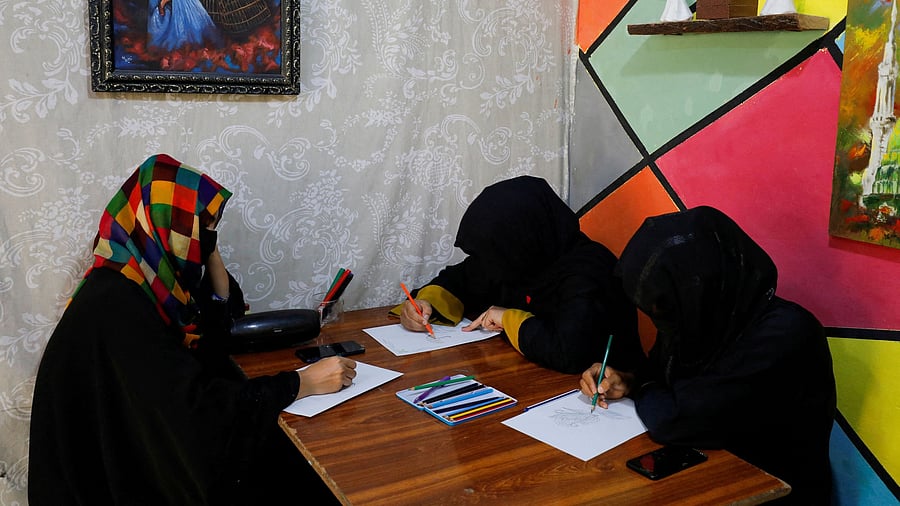
Afghan women
Credit: Reuters File Photo
By Ruth Pollard
For Afghan women, who feel deserted by the international community as their lives have been crushed under the brutal rule of the Taliban, there may finally be a potential avenue for justice.
We should welcome International Criminal Court Prosecutor Karim Khan’s decision to apply for arrest warrants for the Taliban’s Supreme Leader Haibatullah Akhundzada and Chief Justice Abdul Hakim Haqqani, who he says bear criminal responsibility for the persecution of Afghan women and girls. The list of violations is extensive, and includes murder, imprisonment, torture, rape and other forms of sexual violence and enforced disappearances.
Three judges will now decide whether to issue the warrants, a process that usually takes several months. Even then, there isn’t likely to be any immediate action. Akhundzada rarely leaves his base in Kandahar, and Haqqani is unlikely to risk arrest by traveling.
Since the militant group retook control of Afghanistan in 2021, it has banned post-primary education for women and girls, restricted their access to public spaces, prohibited them from singing or reciting poetry in public and severely curtailed their employment opportunities and access to health services. Just last month, the Taliban issued an order banning the construction of windows in residential buildings that overlook areas used by women, and said the existing ones should be blocked.
In his Jan 23 statement, Khan said: “These applications recognize that Afghan women and girls as well as the LGBTQI+ community are facing an unprecedented, unconscionable and ongoing persecution by the Taliban. Our action signals that the status quo for women and girls in Afghanistan is not acceptable. Afghan survivors, in particular women and girls, deserve accountability before a court of law.”
The case against Akhundzada and Haqqani should worry those nations that have chosen to normalize ties with the Taliban, including China, India, Iran, Saudi Arabia and Russia. If the court does go ahead and issue the arrest warrants, it will complicate trade and diplomatic relations and force countries to think twice before making the leap toward warmer dealings.
It also presents a conundrum for US lawmakers, who have been highly selective in their support for the ICC, threatening sanctions against court officials over Israeli Prime Minister Benjamin Netanyahu’s arrest warrant, but commending its actions against Russian President Vladimir Putin. Despite America’s damaging and chaotic withdrawal from Afghanistan in 2021 that preceded the Taliban’s sweep into Kabul, the US was, as of October, the nation’s largest donor and the fate of women and girls is still a concern. In the turmoil of President Donald Trump’s first weeks in office, it is not clear how the government views this latest development.
Groups including Human Rights Watch and Amnesty International have also urged the ICC prosecutor to bring cases for alleged crimes committed by US military and intelligence personnel and former Afghan security forces since the US-led invasion of Afghanistan in 2001. This is unlikely to happen.
The split in global support for the ICC’s actions, and its lack of enforcement mechanisms, highlight the court’s limitations. Its move in 2023 to issue a warrant for the arrest of Putin for war crimes committed in his invasion of Ukraine has not resulted in his apprehension. Nor did the ICC’s November warrant for Netanyahu for crimes against humanity and war crimes committed against Palestinians in Gaza do much to restrain him.
Having devoted years to covering conflict, political violence and terrorism, it is easy to lose faith and question whether international law means anything any more. It certainly doesn’t seem to — impunity is all around us. But however flawed the “rules-based international order” is, it’s all we’ve got. The alternative is a global version of what Trump is attempting to do at home: Defund, defang or dismantle governing institutions and let anarchy rule. We cannot lose hope at this time.
Afghan women and girls need every bit of global support they can get to push back against the Taliban’s unhinged misogyny. They are trapped in a country facing a multidimensional crisis: As the Center for Strategic and International Studies notes, the stability of the economy and the welfare of the people are extremely tenuous.
Another legal avenue against the Taliban opened up in September, when a group of countries including Australia, Korea, Spain, Canada and Germany announced a dispute with Afghanistan under the Convention on the Elimination of All Forms of Discrimination Against Women. This could lead to future proceedings before the International Court of Justice, the top UN court that hears cases brought between states.
These complicated, fraught and flawed processes matter. They show Afghan women that they have not been forgotten and vindicate their brave, ongoing struggle against the Taliban. They also encourage nations to come together in the defense of human rights — a critical show of solidarity in a world ridden with conflict.